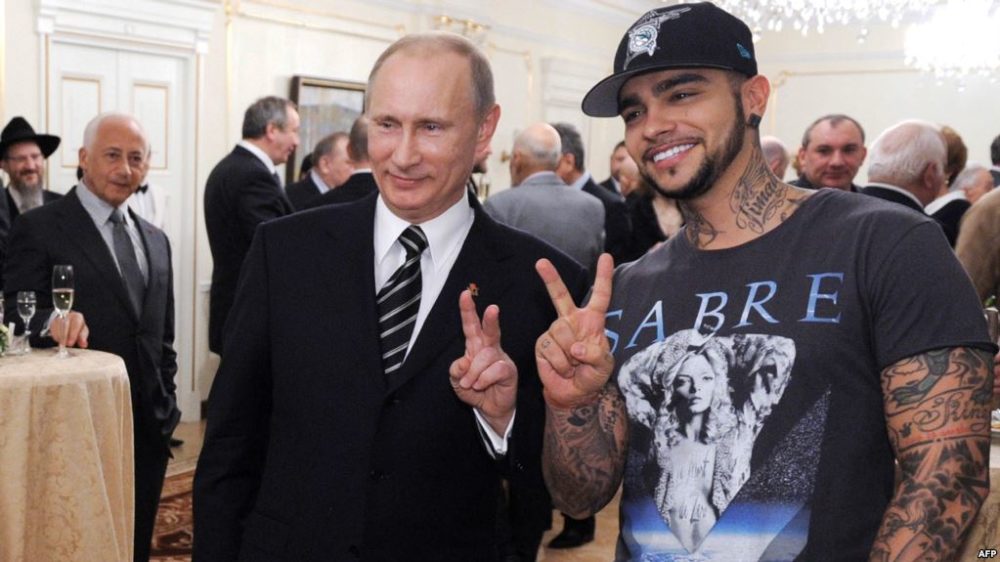Russia’s modern rap scene is like most others in the world—there exists a divide. Highlighted by changing social politics, rap communities—regardless of origin, are heavily partitioned by the old and new schools. Though while most debate over somewhat dated and tedious issues, it seems both sides of the Russian dispute are facing a much more fanatical opposition. The notorious shit head in the big colourful towers—Vladimir Putin.

As was the crumbling of the Soviet Union in 1991, so too was the birth of hip-hop in a newly independent Russian state. Under Borris Yeltzin, Russia struggled to make the transition from communism to capitalism. The Oligarchs got dubiously rich, corruption was rampant, and poverty ensued. Though born from this immorality was the voice of the streets—a voice of resistance.
Influenced by African American countercultural icons Public Enemy and NWA, Russian artists like Kasta or Ptaha ushered in the new wave of anti-establishment and dogmatic awareness. They explored new, post-soviet subjects like consumerism and partying—but also detailed the political and social injustices faced by the lower classes. It was new, brash and dangerous.
On the other side of these protests was the beginning of the 21st century and the modern age of Russian hip-hop. Since Yeltzin’s resignation in 1999, Vladimir Putin has dominated the presidency of the state. Largely accredited for saving Russia’s national identity, his questionably long rule has also seen a depletion in social morality. Restrictions on press freedoms, the near extinction of LGBTQI+ rights, as well as women and minorities taking second-class roles have all been prominent in Putin’s tenure.
In light of these transgressions it would seem the continuation of an anti-government ideal would prevail within the rap community. Though due to a tidier Russia, one whose raw beginnings weren’t experienced by the millennial generation, hip-hop content has turned to the disposable—many citing a more streamlined propaganda and systematic intervention as catalyst.
Consumerism, sex and drugs have taken the main stage while only a select few are keeping the original ethos of antagonism alive. Many believe the generational divide has become clear when it comes to political interest. The social disunions and shambles that were plain to see during Russia’s modern birth now have a refined, comfortable surface. It’s not just the rappers but the youth in general that are happy in complacency.
Perhaps evoking some of his passed KGB methods, Putin recognised rap as a powerful tool in garnering the attention of a powerful youth. In 2009, he was given rap’s seal of approval with his appearance on the ‘Battle for Respect’ TV program—in a beige turtleneck too, how street. His 2012 presidential campaign would see one of Russia’s biggest stars, Timati, film a commercial for the candidate. Putin would call the genre art with a unique Russian charm.
In 2018, despite what side of the generational gap you stand on, Russian rap music exits within three distinct categories—sex, drugs and protest. With these artists gaining hundreds of millions of views online, it goes without saying that Putin and the conservative kremlin are worried—very worried.
Under the guise of ‘saving-Russia’s-youth-from-moral-corruption’, the Kremlin began cancelling extensive tour dates. Other extreme cases have seen rapper’s, like Husky, being pinned as extremist and jailed for mild hooliganism. A measure quickly noted as counterproductive, his imprisonment gained international attention and Husky was released 12 days later. His charges dropped.
Desperate to regain control, Putin has noted the outlawing of rap impossible—instead, he wishes to redirect and lead it in a less provocative direction.
Since the Kremlin’s use of heavy-handed tactics, Russian rap superstars Oxxxymiron, Basta and Noize MC organised the I’m Going To Sing My Music charity concert in Moscow. Oxxxymiron, real name Miron Fyodorov, took to Twitter saying- “This is not just about Husky but about all of us and the future of music in our country.” Kicking back at censorship in art and music, the concert was a huge success with thousands of enthusiastic Muscovites attending.
Not the first time Russia has attempted to silence non-conservative art, one need only cast their mind back to 2012 and Pussy Riot’s imprisonment—the feminist punk group performing an impromptu gig in Moscow’s Cathedral of the Christ The Savior. Convicted of “hooliganism motivated by religious hatred”, three members were sentenced to two years behind bars.
Like it or not, the new age of rap music has caught an international fire. Though where most of us are capable of clicking back to Kylie Minogue, Putin, sadly, is not. It looks as though we’ll be hearing a lot more from his battle with the arts. Hopefully, regardless of generation and style, Russian alternative music can prevail over this systematic targeting of free speech.
Let us know what you think about Putin’s decision in the comments below.







